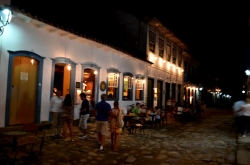ABOUT Thonburi
Thonburi (Thai: ธนบุรี) is an area of modern Bangkok. During the era of the kingdom of Ayutthaya, its location on the right (west) bank at the mouth of the Chao Phraya River had made it an important garrison town, which is reflected in its name: thon (ธน) a loanword from Pali dhána wealth and buri (บุรี), from púra fortress. The full formal name was Thon Buri Si Mahasamut (กรุงธนบุรีศรีมหาสมุทร 'City of Treasures Gracing the Ocean'). For the informal name, see the history of Bangkok under Ayutthaya.
In 1768, a year after the sack of Ayutthaya by the Burmese, General Taksin took back Thonburi and, by right of conquest, made it the capital of the Thonburi Kingdom with himself king until 6 April 1782. Rama I, the newly enthroned king, moved the capital across the river, where stakes driven into the soil of Bangkok for the City Pillar at 06:45 on 21 April 1782, marking the official founding of the new capital. Thonburi remained an independent town and province, until it was merged with Bangkok in 1971. Thonburi stayed less developed than the other side of the river. Many of the traditional small waterways, khlongs, still exist there, while they are nearly gone from the other side of the river.
In 1950, Bangkok had around 1.3 m people, and the municipality of Thonburi around 400,000. In 1970 Thonburi was Thailand's second largest city proper with around 600,000 residents.
Wongwian Yai is a landmark of Thonburi District.
In 1768, a year after the sack of Ayutthaya by the Burmese, General Taksin took back Thonburi and, by right of conquest, made it the capital of the Thonburi Kingdom with himself king until 6 April 1782. Rama I, the newly enthroned king, moved the capital across the river, where stakes driven into the soil of Bangkok for the City Pillar at 06:45 on 21 April 1782, marking the official founding of the new capital. Thonburi remained an independent town and province, until it was merged with Bangkok in 1971. Thonburi stayed less developed than the other side of the river. Many of the traditional small waterways, khlongs, still exist there, while they are nearly gone from the other side of the river.
In 1950, Bangkok had around 1.3 m people, and the municipality of Thonburi around 400,000. In 1970 Thonburi was Thailand's second largest city proper with around 600,000 residents.
Wongwian Yai is a landmark of Thonburi District.




